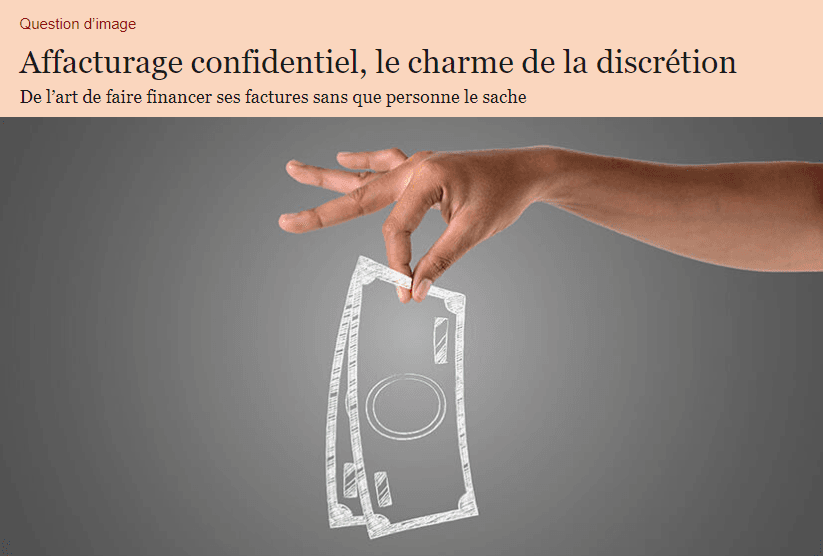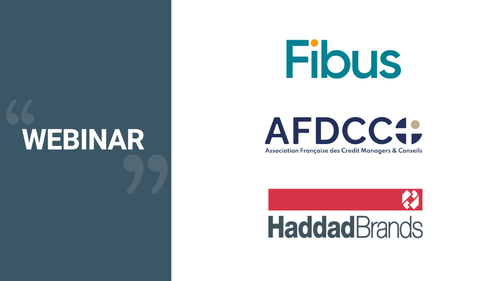Confidential factoring: the charm of discretion
Confidential factoring, or: the art of having your invoices financed without anyone knowing. Romain Chaufour, head of development at Fibus, was questioned by Le Nouvel Économiste on the goals, advantages and special features of this financing tool.


Over the past decade, more and more companies have used factoring to manage their cashflow and to tap into an additional line of financing.
Even so, this technique continues, unjustly, to be regarded as a means of financing only for distressed companies. To get around this obstacle, factors have come up with a solution that’s been very popular with large companies – confidential factoring. This solution helps speed up payment of invoices, without debtors’ being aware of their suppliers’ factoring contract. This accounting trick allows the supplier to protect its image.
No, factoring is not just for companies having one foot in the grave. While this notion stubbornly lives on, most companies using this financing solution do so to better manage their cashflow, to expand, and to have easy access to an additional credit line.
To understand confidential factoring, first we have to know what factoring is. Factoring involves selling receivables to a specialised company to accelerate the payment of invoices. A company sells the receivable to a factor and gets paid immediately. The company boosts its cash holdings and acquires an additional source of financing that is less expensive than a banking overdraft. This advance payment of a debt has a major advantage – it does not undermine the company’s capacity to finance its growth plans.
No, factoring is not just for companies having one foot in the grave. While this notion stubbornly lives on, most companies using this financing solution do so to better manage their cashflow, to expand, and to have easy access to an additional credit line.
To understand confidential factoring, first we have to know what factoring is. Factoring involves selling receivables to a specialised company to accelerate the payment of invoices. A company sells the receivable to a factor and gets paid immediately. The company boosts its cash holdings and acquires an additional source of financing that is less expensive than a banking overdraft. This advance payment of a debt has a major advantage – it does not undermine the company’s capacity to finance its growth plans.
"In 2022, 176 billion euros in invoices were handled under confidential factoring, or 66 % of the factoring market."
Over the past decade, factoring has surged from almost 200 billion euros in repurchased invoices in 2013 to 432 billion euros in 2023. “Factoring has become a common way of covering financing needs for companies of all types, all qualities and all statuses, as long as they are BtoB”, note Philippe Pougeard, deputy CEO of Société Générale Factoring.
Even so, some managers still believe that factoring is only for distressed companies. Those that use factoring prefer to keep a low profile to protect their image or to avoid requests for discounts. To get around this problem, an offering has emerged on the market and has spread to all the most highly structured large, medium-sized and small companies – confidential factoring. In 2022, 176 billion euros in invoices were handled under confidential factoring, or 66 % of the factoring market, according to the French Association of Financial Companies.
Even so, some managers still believe that factoring is only for distressed companies. Those that use factoring prefer to keep a low profile to protect their image or to avoid requests for discounts. To get around this problem, an offering has emerged on the market and has spread to all the most highly structured large, medium-sized and small companies – confidential factoring. In 2022, 176 billion euros in invoices were handled under confidential factoring, or 66 % of the factoring market, according to the French Association of Financial Companies.
Fewer services, but lower costs
The principle is this: “in confidential factoring, the factor does not let the buyer know that it exists. The factor is acting on the company’s behalf but its name is not mentioned”, says Marc Bonnemains, deputy CEO in charge of development at BPCE Factor, the factoring company of Banque Populaire and Caisse d’Épargne. Technically, the payment details are still in the company’s name, but the dedicated receiving account is “pledged” by the factor. It actually belongs to the company, but the sums are forwarded each evening to the factor. The factor retains the option of securing itself against the repayment of invoices advanced.
The second difference: in conventional factoring the factor is in control and reserves the right to send reminders to the debtor. But, in confidential factoring, the companies continue to manage themselves their customer receivables and payment collection. Confidential factoring has fewer services and therefore costs less.
But this non-notified business also has drawbacks. For one thing, it is not always very comfortable for the factor. “While a company uses factoring, including all three conventional services (advances on customer receivables, guarantees against insolvency, and management of customer receivables), the factor is in direct contact with the client’s buyers. It has access to additional information on the various issues that may explain a payment delay. This is not the case with confidential factoring”, notes Pougeard. In confidential factoring, the factor has a harder time qualifying and controlling its risks.
The second difference: in conventional factoring the factor is in control and reserves the right to send reminders to the debtor. But, in confidential factoring, the companies continue to manage themselves their customer receivables and payment collection. Confidential factoring has fewer services and therefore costs less.
But this non-notified business also has drawbacks. For one thing, it is not always very comfortable for the factor. “While a company uses factoring, including all three conventional services (advances on customer receivables, guarantees against insolvency, and management of customer receivables), the factor is in direct contact with the client’s buyers. It has access to additional information on the various issues that may explain a payment delay. This is not the case with confidential factoring”, notes Pougeard. In confidential factoring, the factor has a harder time qualifying and controlling its risks.
Only for structured companies
That’s why confidential factoring is not available to all companies. There is some selectivity involved. Each factor determines which companies are eligible, based on their size and financial health. The smallest ones (with less than 7 million euros of revenues) are generally not eligible for confidential factoring. “Confidential factoring is mainly for structured companies with a solid foundation of accounting services and payment reminders. We must ensure the company’s ability to conduct billing audits of its clients, and to follow administrative procedures. Its payment process must be efficient, with reminders sent out on time”, Bonnemains explains.
"The smallest companies (with less than 7 million euros of revenues) are generally not eligible for confidential factoring."
So, to have access to non-notified factoring, you must prove your credentials. First, a “factorability” audit of the company’s business activity is conducted. The transferor’s quality of risk, the company’s financial health, the bank’s in-house rating, etc., are placed under the microscope. “We verify the client’s processes, business activity, invoicing and receivables. As a matter of principle, we only finance invoices that are certain, liquid and due, meaning incontestable. When the factor is not comfortable enough to give up control completely to the client, we offer adjusted solutions. Such solutions to meet the need for confidentiality, such as line-by-line tracking, which provides closer support in managing customer receivables on a daily basis”, says Cécile Dauthier, head of sales & marketing development at Crédit Agricole Leasing & Factoring.
No guarantee of confidentiality
Regardless, it’s worth comparing offers. “Not all players are on the same page in terms of accessibility to confidential information. At Factofrance, we first analyse the quality of customer receivables, including any late payments, the lack of litigation, percentage of positive outstanding, etc.”, adds Cédric Turquois, head of sales & marketing at Factofrance.
And, lastly, when a company signs a non-notified factoring contract, it must keep in mind that confidentiality is not guaranteed. Confidentiality could be sacrificed in the event of a steep turn for the worse in the company’s financial health. “In that case, the factor will not cut off financing completely but will take back control”, explains Romain Chaufour, head of development at Fibus, a factoring broker. The factor informs the buyers that they must settle the invoices directly with it. However, some middle-ground solutions are possible. “When you have lost confidentiality, some contracts allow you, for example, to retain control over management mandates, including accounting lettering, payment receptions, reminders and collections”, Chaufour adds. Another option: breaking the contract. This is seldom done by distressed companies, which, in spite of everything, prefer to keep financing in place.
And, lastly, when a company signs a non-notified factoring contract, it must keep in mind that confidentiality is not guaranteed. Confidentiality could be sacrificed in the event of a steep turn for the worse in the company’s financial health. “In that case, the factor will not cut off financing completely but will take back control”, explains Romain Chaufour, head of development at Fibus, a factoring broker. The factor informs the buyers that they must settle the invoices directly with it. However, some middle-ground solutions are possible. “When you have lost confidentiality, some contracts allow you, for example, to retain control over management mandates, including accounting lettering, payment receptions, reminders and collections”, Chaufour adds. Another option: breaking the contract. This is seldom done by distressed companies, which, in spite of everything, prefer to keep financing in place.
Embellishing financial ratios via deconsolidating factoring
This is the second major innovation that has made such a big contribution to the expansion of factoring in France. Deconsolidating factoring is an accounting trick used to enhance financial debt ratios and a company’s average payment times. It consists of deconsolidating receivables once and for all while transferring their risk to the factor. This has the effect of shrinking the client receivables. This balance sheet window-dressing erases the drawback of factoring with recourse, which automatically increases a company’s debt burden.
Most factoring contracts of this type are used by listed companies that conduct a deconsolidating divestment at each closing, whether quarterly or annually. Factoring without recourse is also common in leveraged buyouts (LBOs), as it enhances the ratio of financial autonomy. “Companies under an LBO have debt thresholds that they must not exceed. Deconsolidated factoring gives them recourse of an additional financial support without increasing those thresholds”, says Pougeard.
But such operations are strictly supervised. For factoring to be considered deconsolidating, the factor must no longer be able to return ownership of the invoices. Divestment of receivables must be without recourse. “External auditors are the sole arbiters. They have recently been more exacting and demanding in approving the deconsolidating character of a factoring programme. Discussions take longer. Deconsolidation is easier to obtain under French GAAP [Generally Accepted Accounting Principles – Editor’s note] than under IFRS [International Financial Reporting Standards] or under US GAAP”, Chaufour notes.
Deconsolidating factoring has been used heavily in recent years, but has suffered a slight dip, tracking the downward curve of the factoring market in late 2023. “With a three-month Euribor at almost 4%, some major companies have halted or reduced their deconsolidating divestments. This has weighed on the market”, Chaufour says.
Most factoring contracts of this type are used by listed companies that conduct a deconsolidating divestment at each closing, whether quarterly or annually. Factoring without recourse is also common in leveraged buyouts (LBOs), as it enhances the ratio of financial autonomy. “Companies under an LBO have debt thresholds that they must not exceed. Deconsolidated factoring gives them recourse of an additional financial support without increasing those thresholds”, says Pougeard.
But such operations are strictly supervised. For factoring to be considered deconsolidating, the factor must no longer be able to return ownership of the invoices. Divestment of receivables must be without recourse. “External auditors are the sole arbiters. They have recently been more exacting and demanding in approving the deconsolidating character of a factoring programme. Discussions take longer. Deconsolidation is easier to obtain under French GAAP [Generally Accepted Accounting Principles – Editor’s note] than under IFRS [International Financial Reporting Standards] or under US GAAP”, Chaufour notes.
Deconsolidating factoring has been used heavily in recent years, but has suffered a slight dip, tracking the downward curve of the factoring market in late 2023. “With a three-month Euribor at almost 4%, some major companies have halted or reduced their deconsolidating divestments. This has weighed on the market”, Chaufour says.
These articles may interest you

How Chimirec unlocked the full potential of its factoring with ARI Trade, by Fibus Digital
With ARI Trade, the Chimirec Group has reduced the time spent managing its factoring operations from 4 days to 1.5 days per month — representing a total time saving of 30 days per year.
Additional benefits for Chimirec’s CFO include improved working capital, a consolidated view across 15 factoring contracts, and enhanced receivables traceability.
Additional benefits for Chimirec’s CFO include improved working capital, a consolidated view across 15 factoring contracts, and enhanced receivables traceability.

How the Credit Manager safeguards the company’s cash flow
A function at the heart of financial stability The Credit Manager’s role extends far beyond preventing bad debt: today, they act as the true conductor of the order-to-cash process, ensuring the company maintains healthy, predictable, and actively managed cash flow. We
spoke with Thibaut Robet, CEO of Fibus, a firm specialising in order-to-cash management.
spoke with Thibaut Robet, CEO of Fibus, a firm specialising in order-to-cash management.

How can credit insurance support growth in a sector under pressure?
Economic difficulties are mounting and weighing more heavily on certain sectors: how can you make the Credit Manager a business partner who supports the company's growth? Discover the testimony of HADDAD BRANDS EUROPE in the webinar hosted by Alexia Monteillet, Credit Risk Manager at HADDAD BRANDS EUROPE, and Marc Chaquès, Credit Insurance Director at Fibus, in partnership with the AFDCC.
Contact us, so that, together, we can find the best solution for financing your accounts receivable.
Write us
